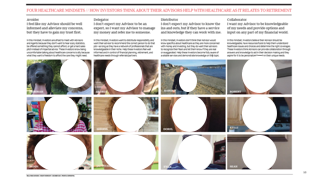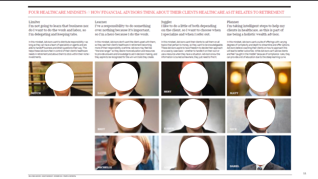Large Main Street Bank's project focused on exploring consumers’ attitudes and behaviors around healthcare cost planning to strengthen a business case to offer a suite of healthcare cost planning tools and resources.
Background
Healthcare is a critical topic in conversations between Large Main Street Bank Financial Advisors and their clients (noting, it’s one of the more popular “goals” identified inside goal plans), and it has become a topic of conversation with Advisors who have met with the executive committee. There are resources and solutions available today, but they are not viable for the long term. We want to understand what our Advisors and clients need (resource/tool/support) in order to better support their clients on this topic.
Objectives
- What are client expectations around financial services and healthcare cost planning?
- What are their boundaries?
- What do financial advisors need to have these conversations?
- What risk are posted to the financial advisor if this topic is not addressed? To the firm?
- What needs to exist to limit risks to clients/financial advisors?
- What does the financial advisor conversation look like today in this space? What makes the most sense for this topic going forward?
Time Period - August 21, 2019 to December 16, 2019
Methods - Competitive intelligence gathering, 10 financial advisor interviews, and 12 investor diary study.
Schedule
10/28 – Kickoff meeting
10/29 -11/15 - Planning and recruiting
11/18 -12/4 - Dscout diary study and competitive intelligence gathering
11/18 -11/22 - Financial Advisor interviews
12/2 -12/13 - Analysis
12/16 – Report Out
Competitive intelligence: secondary research
Gathered insight into what the other wire houses were doing in this space and how they currently supported their advisors and clients and what they’re planning to do.
Investors research: diary study
Conduct a diary study with almost retired (age 55-64) and retirees; a screener collected the interest insights on the general population of people who currently have a Financial Advisor. Then, a diary collected the insights on people who currently have a financial advisor, are between 5 years out from retiring or are currently retired, and want/expect their financial advisors to help or provide support on their healthcare concerns/questions
Financial Advisors research: interviews
Talk to 10-15 financial advisors to understand their current practices around Healthcare and what they’re looking for from the firm in terms of support around this topic and how their clients feel about this topic


Mindsets
Through research, we saw eight differentiated healthcare cost planning mindsets. The goal wasn't to convert one mindset to another, but to support people across mindsets as they explore—or decide not to explore—healthcare cost planning in service of a given problem or opportunity.
Your healthcare cost planning mindset impacts the conversations you have with your financial advisor— and your financial advisors healthcare cost planning mindset impacts the conversations they have with you.
This has big implications for the features and functionality of a healthcare cost planning suite of tools and resources.
Scenarios Activity
We facilitated an activity with the business, to explore scenarios where different Client Mindsets and Financial Advisor Mindsets are interacting with each other.
The firm gained insight into the opportunities (green) and risks (risks) for how financial advisors can effectively approach this conversation and what Financial Advisors use when having conversations related to healthcare.
Pyramid of Tools and Resources
We facilitated ideation around emerging offerings. The business looked at the tools people use today, the tools and resources they co-created during the diary study, and shared during the interviews.